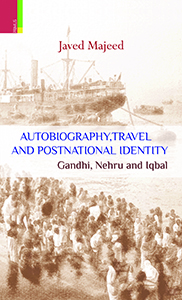
Autobiography, Travel and Postnational Identity: Gandhi, Nehru and Iqbal
AUTHOR- Javed Majeed
| HB ₹1350 |
||
INFORMATION
- AUTHOR : Javed Majeed
- HB ISBN : 978-93-84082-23-9
- Year : 2015
- Extent : viii + 328 pp.
- Discount available on checkout
- Usually dispatched within 3 to 5 working days.
Autobiography, Travel and Postnational Identity
| HB
₹1350 . $ . ₤ |
PB
₹ . $ . ₤ |
|
| POD
₹ . $ . ₤ |
e-Book
₹ . $ . ₤ |
INFORMATION
- AUTHOR – Javed Majeed
- ISBN – 978-93-84082-23-9
- Year – 2015
- Extent: 400 + 40 coloured illustrations
- 10% discount + free shipping
- Usually dispatched within 3 to 5 working days.
Bringing together life-writing, travel-writing and postcolonial studies, this book argues that concepts of travel were crucial to the way Gandhi, Nehru and Iqbal articulated selfhood in their life-writing. It shows how their ‘travelling autobiographies’ differed from earlier traditions of nineteenth-century Indian and colonial travel writing. Unlike other autobiographies of the time by Indians in which the nation absorbed the individual, rethinking ideas of travel enabled them to express their ideas of selfhood outside overarching notions of nation or nationhood.
Developing this line of enquiry into the ties between the self, travel and anti-colonial lifewriting, Majeed examines Gandhi’s stage fright and shyness as part of a larger gender politics, and discusses the politics of translation and truthfulness in his reading of the Gita. The stylistic devices used by Nehru in his writings to evoke his distinctive sense of self in relation to travel are explored as part of his resistance to narrow national identities, and Iqbal’s poetry is reinterpreted as a form of travelling autobiography which reconceives Islam in relation to Western modernity.
The Author
Javed Majeed is currently Head of Comparative Literature and is Professor of Comparative Literature and English at King’s College, London. His books include Muhammad Iqbal: Islam, Aesthetics and Postcolonialism (2009), Hali’s Musaddas: The Flow and Ebb of Islam (1997, with Christopher Shackle) and Ungoverned Imaginings: James Mill’s The History of British India and Orientalism (1992).
Bringing together life-writing, travel-writing and postcolonial studies, this book argues that concepts of travel were crucial to the way Gandhi, Nehru and Iqbal articulated selfhood in their life-writing. It shows how their ‘travelling autobiographies’ differed from earlier traditions of nineteenth-century Indian and colonial travel writing. Unlike other autobiographies of the time by Indians in which the nation absorbed the individual, rethinking ideas of travel enabled them to express their ideas of selfhood outside overarching notions of nation or nationhood.
Developing this line of enquiry into the ties between the self, travel and anti-colonial lifewriting, Majeed examines Gandhi’s stage fright and shyness as part of a larger gender politics, and discusses the politics of translation and truthfulness in his reading of the Gita. The stylistic devices used by Nehru in his writings to evoke his distinctive sense of self in relation to travel are explored as part of his resistance to narrow national identities, and Iqbal’s poetry is reinterpreted as a form of travelling autobiography which reconceives Islam in relation to Western modernity.
The Author
Javed Majeed is currently Head of Comparative Literature and is Professor of Comparative Literature and English at King’s College, London. His books include Muhammad Iqbal: Islam, Aesthetics and Postcolonialism (2009), Hali’s Musaddas: The Flow and Ebb of Islam (1997, with Christopher Shackle) and Ungoverned Imaginings: James Mill’s The History of British India and Orientalism (1992).




